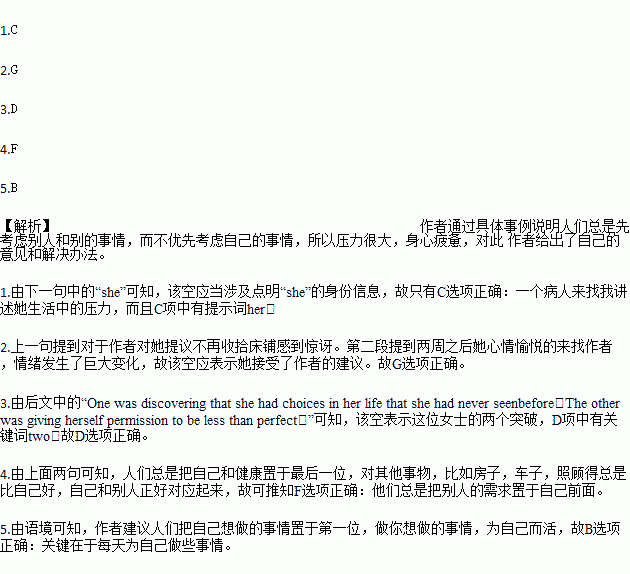题目内容
With the development of society,it is common that many people are rushing all the way and all day,tired and subhealthy. 1. She described all the things she had to do—one was to make her bed—from the moment she woke up until she flew out of the door for work.I suggested she experiment by not making her bed for two weeks.She was shocked,probably thinking I’d been brought up by wolves in a forest.2.
Two weeks later she went into my office merrily.She had left her bed unmade for the first time in 42 years—and nothing bad had happened.“And you know what?”she said.“I don’t dry my dishes anymore,either.”
3. One was discovering that she had choices in her life that she had never seen before.The other was giving herself permission to be less than perfect.This story shows an important principle about managing time:No one can do it a11.Each of us has to make choices and accept trade-offs(利弊权衡).The problem is that many people choose in ways that put themselves and their health last. They take better care of their houses and cars than they do of themselves. 4.
So what is the solution? There’s an easy way.Decide what you want in your life,and put that first.On a daily basis,that should include regular meals,enough sleep and time with your family.Exercise,leisure,friendships and hobbies should also be regular aspects of life.5.The choice is yours:whatever makes you feel good about yourself and your life.Take a nap.Take a walk.Take time to play the piano.Stop bringing your briefcase home from the office.Stop keeping your house as clean as your mother kept hers.Fill more of your time with want-to-dos instead of have-to-dos.
A.Most people do not take time to relax themselves.
B.The point is to do something for yourself every day.
C.A patient came to see me about the stress in her life.
D.This woman had made two major breakthroughs.
E.Above all,you needn’t do anything for yourself regularly.
F.They put everyone else’s needs ahead of their own.
G.However,she went along with my idea.
 开心蛙口算题卡系列答案
开心蛙口算题卡系列答案
